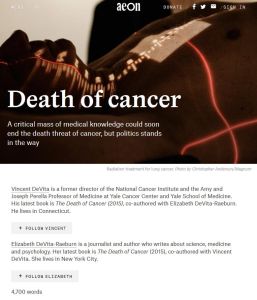Join getAbstract to access the summary!

Join getAbstract to access the summary!
Vincent DeVita and Elizabeth DeVita-Raeburn
Death of Cancer
A critical mass of medical knowledge could soon end the death threat of cancer, but politics stands in the way
Aeon, 2016
What's inside?
The US government has spent more than $100 billion to kill cancer, but bureaucracy won’t let the disease die.
Recommendation
For decades, battles have been fought in the war on cancer. Soon, the war could and should be over. Vincent DeVita is a pioneer oncologist and former director of the National Cancer Institute. Writing with his journalist daughter Elizabeth DeVita-Raeburn, he explains in plain language the “hallmarks” of cancer cells and outlines what kind of cancer research would be necessary – if only government laws allowed it. getAbstract recommends this expert yet accessible article to cancer patients and would like to put this plea for a new cancer act into the hands of those in charge.
Summary
About the Authors
Vincent DeVita is a professor at Yale and the former director of the National Cancer Institute. His daughter Elizabeth DeVita-Raeburn is a science journalist.
















Comment on this summary